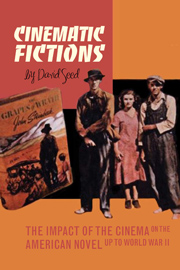Book contents
- Frontmatter
- Contents
- Introduction
- 1 Beginnings
- 2 Modernist Experiments: Gertrude Stein and Others
- 3 H.D. and the Limits of Vision
- 4 Ernest Hemingway: The Observer's Visual Field
- 5 Success and Stardom in F. Scott Fitzgerald
- 6 William Faulkner: Perspective Experiments
- 7 John Dos Passos and the Art of Montage
- 8 Dreiser, Eisenstein and Upton Sinclair
- 9 Documentary of the 1930s
- 10 John Steinbeck: Extensions of Documentary
- 11 Taking Possession of the Images: African American Writers and the Cinema
- 12 Into the Night Life: Henry Miller and Anaïs Nin
- 13 Nathanael West and the Hollywood Novel
- Bibliography
- Index
Introduction
- Frontmatter
- Contents
- Introduction
- 1 Beginnings
- 2 Modernist Experiments: Gertrude Stein and Others
- 3 H.D. and the Limits of Vision
- 4 Ernest Hemingway: The Observer's Visual Field
- 5 Success and Stardom in F. Scott Fitzgerald
- 6 William Faulkner: Perspective Experiments
- 7 John Dos Passos and the Art of Montage
- 8 Dreiser, Eisenstein and Upton Sinclair
- 9 Documentary of the 1930s
- 10 John Steinbeck: Extensions of Documentary
- 11 Taking Possession of the Images: African American Writers and the Cinema
- 12 Into the Night Life: Henry Miller and Anaïs Nin
- 13 Nathanael West and the Hollywood Novel
- Bibliography
- Index
Summary
This book asks a simple question: given their fascination with the new medium of film, did American novelists attempt to apply cinematic methods in their own writings? There have been a number of studies of individual writers' close involvement with the cinema and with movie production, and I draw on these, in several cases adding to this historical documentation. But these details offer a necessary preamble to my main subject of methodological influence and congruence. Notwithstanding the invaluable studies by Garrett Stewart and David Trotter, I argue throughout for an interchange between the media, recognizing of course that any such interchange can only be approximate, as were the aesthetic analogies between fiction and painting in the latter half of the nineteenth century. The time frame of this study extends from the turn of the nineteenth century up to the Second World War.
From its very beginnings the cinema has played a special role in defining American culture. Indeed Amy Kaplan has tied the new medium to the emergence of the USA as an imperial power: ‘A majority of these films showed Americans in motion: marching, riding, sailing, embarking on ships, and returning home’. The presentation of mobility thus had a political point to make in suggesting the dynamism of the nation itself. By the 1910s, Norman K. Denzin has argued, ‘American society became a cinematic culture, a culture which came to know itself […] through the images and stories that Hollywood produced’.
- Type
- Chapter
- Information
- Cinematic FictionsThe Impact of the Cinema on the American Novel up to World War II, pp. 1 - 6Publisher: Liverpool University PressPrint publication year: 2009



